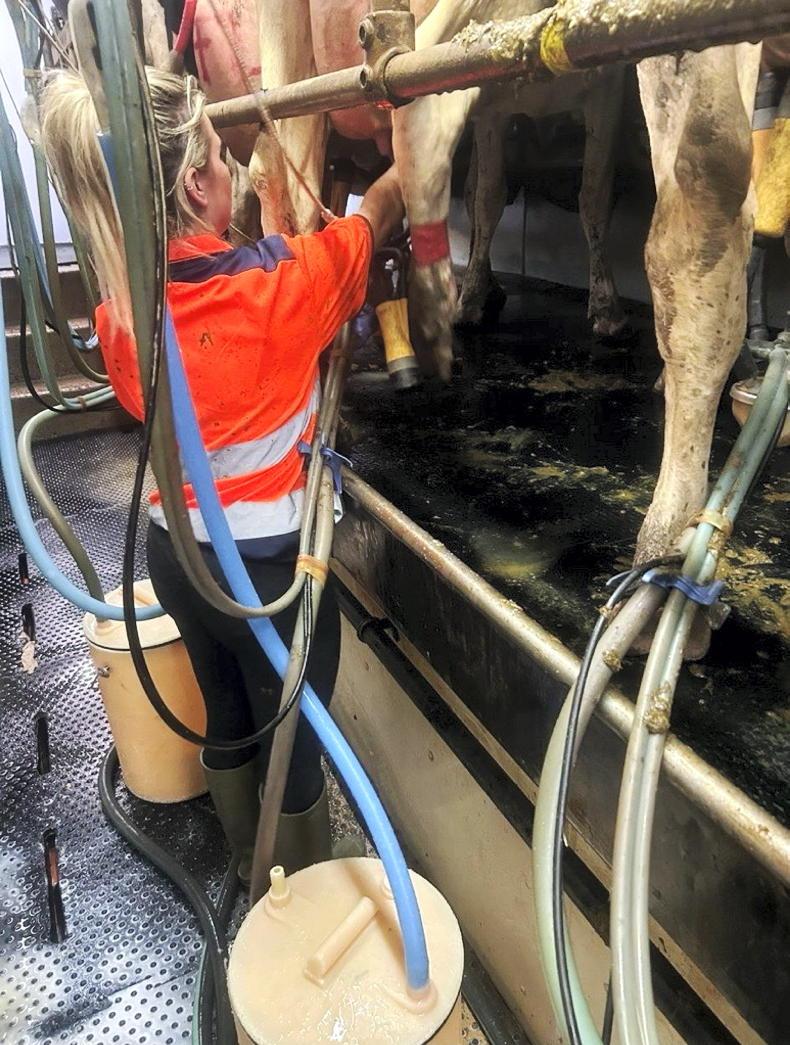"I grew up on the home farm in Cross Keys, Co Cavan. Farming beef, sheep and sucklers. I was alywas out on the farm with my dad. As well as running the family farm my grandad, dad and uncle operate a haulage company, transporting livestock, pigs and fertiliser. This is something I would like to take up after completing my college course.
"I grew up on the home farm in Cross Keys, Co Cavan. Farming beef, sheep and sucklers. I was alywas out on the farm with my dad. As well as running the family farm my grandad, dad and uncle operate a haulage company, transporting livestock, pigs and fertiliser. This is something I would like to take up after completing my college course.
“I went on work placement to a dairy farm and it has confirmed that it is my favourite enterprise. Since then I have been doing relief milking before and after college and at weekends. I am also working with progressive genetics carrying out milk recordings – I have great interest in both the milking and milk recordings.
“I completed my Level 5 and Level 6 green cert in Ballyhaise Agricultural College and after that I decided I wanted to progress into Dundalk Institute of Technology (DkIT) to complete a degree in sustainable agriculture. I have just entered the fourth and final year of my course, and after I finish in May, I am hoping to work in the agriculture sector
Different enterprise
“At home, we are currently a beef, sheep and suckler enterprise. Previously on the farm we had all Angus cattle but over the last number of years we have changed to Charolais and Limousins. Our sheep breeds are Charollais and Texels. Most of our land at home is in one block although we also have land away from home in which we graze and cut for hay in June and August.
“We aim to turn animals out early onto an adequate grass supply to achieve a long grazing season. We strive to close the farm rotation from late October onwards and to keep the rotation length from 18-21 days. In the coming years, I would like to convert to dairy farming at home.

Brona McCabe milking cows on a dairy farm in Dorset while on placement abroad.
“The farm I completed my placement on was JF Cobb & Sons, located in Dorset along the coast of England. In 1928, JF Cobbs was established as mixed farming on a tenanted farm at West Chaldon. This farm operates a variety of different dairies. In 2013, Cobb & Sons commenced expanding and developed the Newburgh dairy site.
“There is a total of 130 employees, some farms are milking twice a day while others are milking three. The main difference I saw between farming at home and farming in the UK is the cow numbers. In the UK, the main target is milk yields instead of milk solids as they are paid per litre and on a fixed contract instead of milk prices fluctuating.
Challenges facing
“Some of the challenges in the agriculture sector for young people are climate change, increased input costs, volatility and access to land. Rising temperatures can shorten growing seasons, stress crops, and increase water consumption. Heat waves can destroy crops, while cold snaps can harm plants. Fertiliser costs have increased as well as diesel for machinery.
“A significant issue facing the industry is volatility and farmers’ ability to manage the price of agricultural products – impacted by factors such as weather patterns.
“Another big challenge I see is getting access to land which is the primary source in farming as well as getting investments into the farm and obtaining the funds necessary to start a farm – purchasing land, equipment and working equipment is generally exceedingly challenging
“I have enjoyed my four years of college so far, completing my two years in Ballyhaise allowed me to gain knowledge on the everyday running of a farm. It also allowed me to carry out practicals on the farm, which is a great way of learning. Students can see how a task is completed and get the opportunity to carry it out themselves, such as tractor driving and dehorning.
“The sustainable course at DkIT is very enjoyable as it is quite broad and covers all the important materials. It allows you to carry out practicals in a laboratory making it easier for students to know if they would like to progress to work in the laboratory after completing the course.
“The classes offer a good insight into important things that need to be carried out on the farm such as Bord Bia inspections and soil sampling. Agriculture is a great course and there are many opportunities and benefits within the sector, I would encourage students who are considering a degree in agriculture to go for it.”





SHARING OPTIONS: